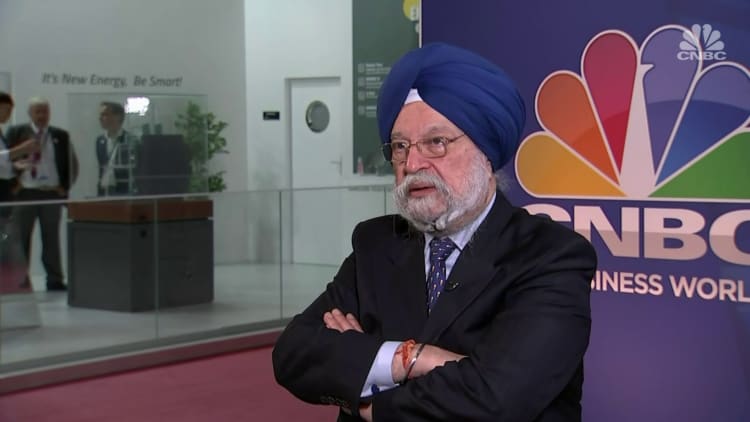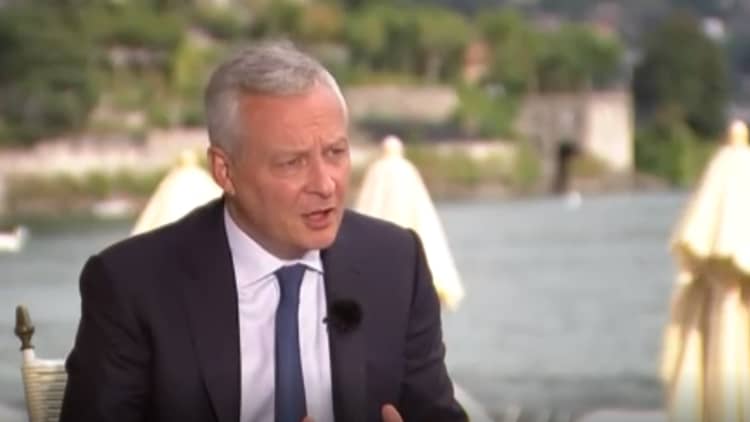[ad_1]
Oil pumping jacks operate in an oilfield near Almetyevsk, Tatarstan, Russia, on Wednesday, March 11, 2020.
Andrey Rudakov | Bloomberg | Getty Images
Indian Petroleum Minister Shri Hardeep Singh Puri on Monday said the country will carefully assess whether to support a G-7 proposal to impose a cap on the price of Russian oil.
“There are many conversations going on due to a large number of factors,” Puri told CNBC’s Hadley Gamble at Gastech 2022 in Milan, Italy.
Asked whether India would sign up to the G-7 proposal to put a price cap on Russian oil, Puri said the world economy was still adjusting to the impact of the coronavirus pandemic and Russia’s invasion of Ukraine.
“Now, what will the proposal mean? We will look at it very carefully,” he said.
Puri added that it was still unclear which countries would take part in the proposed price cap on Russian oil and what the possible implications could mean for energy markets.
Finance ministers representing the G-7 countries on Friday agreed on a plan to implement a price-capping mechanism for Russian oil exports.

The initiative is designed to curtail the Kremlin’s ability to fund its onslaught in Ukraine and better protect consumers amid soaring energy prices.
Energy analysts have been highly skeptical about the integrity of the proposal, however, warning that the policy could backfire if key consumers such as China and India are not involved.
‘I have a moral duty to my consumer’
China and India have increased their purchases of Russian oil following the Kremlin’s invasion of Ukraine, benefiting from discounted rates.
Puri said India consumes around 5 million barrels of oil per day and this largely comes from Iraq, Saudi Arabia, Kuwait and the United Arab Emirates.
Russia accounted for just 0.2% of India’s oil imports at the end of March, Puri said, noting that some criticized India for increasing its supply of Russian oil following the Kremlin’s invasion.
“I said the Europeans buy more in one afternoon than I do in a quarter. I’d be surprised if that is not the condition still. But yes we will buy from Russia, we will buy from wherever,” Puri said.
Asked whether he had a moral conflict with buying Russian oil amid the Kremlin’s onslaught in Ukraine, Puri replied, “No, there’s no conflict. I have a moral duty to my consumer. Do I as a democratically elected government want a situation where the petrol pump runs dry? Look at what is happening in countries around India.”

The EU has called on China and India to take part in the G-7 initiative to reduce the profits that Russia makes from selling oil.
Europe’s Energy Commissioner Kadri Simson told CNBC’s Silvia Amaro on Saturday that China and India “are willing to buy Russian oil products while excusing themselves that this is important for their security of supply. But it is unfair to pay excess revenues to Russia.”
It is not yet clear how the G-7 will implement its price-capping plan. The details are expected to be ironed out before early December when EU sanctions on seaborne imports of Russian crude kick in.
The G-7 is comprised of the U.S., Canada, France, Germany, Italy, the U.K. and Japan.
Russia on Monday vowed to take retaliatory measures over the proposal and says it will stop selling oil to countries that impose price caps on Russian energy exports.
French Finance Minister Bruno Le Maire told CNBC on Saturday that efforts to introduce a price cap on Russian oil require a broad international commitment to be successful.
Rather than a Western-only measure, Le Maire said the initiative should be implemented as a “global measure against war.“
— CNBC’s Silvia Amaro contributed to this report.
[ad_2]
